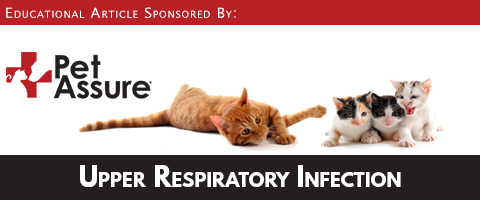Feline Upper Respiratory Infection Calcivirus/Herpesvirus
Feline upper respiratory infection is a very common viral infection, caused most commonly by calicivirus or herpesvirus. It is compared to the human common cold, and usually lasts for about a week. The viruses are spread through moist contact, like sneezes, infected discharges or sharing dishes.
These viruses are recurring, sometimes over a cat’s entire life. Herpesvirus usually recurs about a week after a stressful incident (like a new pet in the house, boarding, surgery).
Susceptible cats include:
- Shelter cats
- Outdoor cats
- Kittens (because their immune system is not strong)
SYMPTOMS:
The following symptoms indicate a mild infection, just like a human cold:
- Sneezing and coughing
- Discharge from the nose, mouth or eyes
- Ulcers in the nose, mouth or eyes
- Hoarse voice
If the infection becomes more serious, you will notice the following symptoms:
- Loss of appetite
- Difficulty breathing with an open mouth
- High fever and lethargy
In kittens, these viruses can lead to pneumonia or arthritis. Call your vet immediately.
DIAGNOSIS:
Your vet may be able to diagnose your cat with a simple physical exam.
Additional tests may include:
- PCR testing: a simple throat swab which is an extremely sensitive test for viruses in your cat’s DNA
- Immunofluorescence: uses a fluorescent dye to illuminate viruses or their antibodies in body tissue
- Radiographs: may show inflammation or infection of the lungs, indicating pneumonia
TREATMENT:
- Hospitalization: your cat will be boarded in a cage with proper humidity and oxygen to help breathing
- IV fluids for dehydration
- Anti-bacterial medication: This does not help against the actual virus, but will prevent and treat any secondary bacterial infections that can result from the virus
- Oral medications for ulcers
- Eye ointments
- Nose drops for congestion
- Vaccines
PREVENTION:
- Follow the vaccine schedule recommended by your vet
- Only allow vaccinated cats in your house
- Separate infected cats from other cats
- Wash your hands after handling the infected cat, because contaminated hands can spread the disease to other cats
- Maintain a stress-free environment to prevent recurrence
PROGNOSIS:
Your cat may need to be hospitalized to safely survive the symptoms, but there is a very good prognosis. Death in adult cats is unusual; serious illness and death in young kittens is more common.



